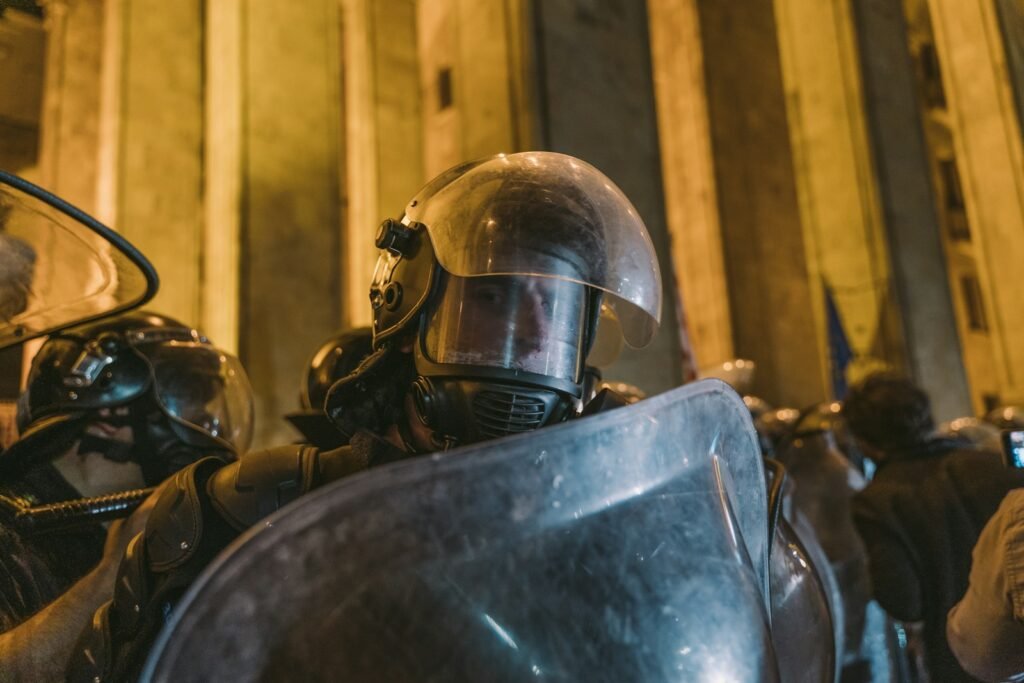
Washington, D.C. – The U.S. Department of the Treasury’s Office of Foreign Assets Control (OFAC) has announced sanctions on two senior Georgian officials from the Ministry of Internal Affairs, following their involvement in violent crackdowns on journalists, opposition figures, and peaceful protesters. The sanctions, imposed under the Global Magnitsky Act (Executive Order 13818), target the Georgian Minister of Internal Affairs Vakhtang Gomelauri and Deputy Minister Aleksandre Darakhvelidze, as well as other high-ranking police officials. This action follows similar sanctions imposed by OFAC on two other Georgian officials in September 2024.
“In the wake of Georgia’s election, key officials in the Ministry of Internal Affairs engaged in a severe and vicious crackdown against their own people, including the intentional targeting of journalists and use of violence,” said Acting Under Secretary of the Treasury for Terrorism and Financial Intelligence Bradley T. Smith. “The United States remains committed to holding accountable those who seek to limit the rights of their citizens and undermine fundamental freedoms — in Georgia and around the world.”
The sanctions come in coordination with the United Kingdom, which has designated five individuals responsible for human rights abuses in Georgia, including violent attacks on journalists and peaceful demonstrators. The U.S. and U.K. actions reflect increasing concerns about the suppression of dissent and the undermining of democracy in Georgia.
Crackdown on Protests and Media Freedom
Georgia has seen widespread protests in 2024, triggered by public opposition to the Georgian Dream party’s decision to pause the country’s European Union accession talks. This move, which many see as a step back from Georgia’s European aspirations, has been widely criticized as a shift towards closer ties with Russia, particularly at a time when Moscow’s influence in the region is a growing concern.
In response to the protests, Georgian authorities, including the Ministry of Internal Affairs, launched a brutal crackdown. Riot police used water cannons, tear gas, and rubber bullets against protesters, and there have been numerous reports of targeted violence against individuals, including political opposition leaders and journalists. The Public Defender (Ombudsman) of Georgia verified accounts of beatings, threats, and harassment by police, particularly by the Special Task Department, which is under the control of the Ministry of Internal Affairs.
The U.S. and U.K. sanctions specifically target those officials who played a key role in overseeing and facilitating these violent operations. The sanctioned individuals include:
- Vakhtang Gomelauri – Minister of Internal Affairs
- Aleksandre Darakhvelidze – Deputy Minister of Internal Affairs
- Sulkhan Tamazashvili – Tbilisi Police Department Director
- Zviad Kharazishvili – Chief of the Special Tasks Department
- Mileri Lagazauri – Deputy Head of the Special Tasks Department
These officials are being barred from entering the U.K. and are subject to asset freezes. The sanctions come amid increasing concerns about the erosion of democratic freedoms in Georgia, with reports of systematic repression and violence directed at peaceful dissent.
International Reactions and Further Measures
The U.S. and U.K. governments have condemned the violence and repression. Acting Under Secretary of the Treasury for Terrorism and Financial Intelligence Bradley T. Smith stated, “The United States remains committed to holding accountable those who seek to limit the rights of their citizens and undermine fundamental freedoms — in Georgia and around the world.”
The U.K. Foreign Secretary, David Lammy, called the attacks on peaceful protesters, journalists, and opposition leaders an “egregious attack on democracy” and emphasized the U.K.’s commitment to holding the perpetrators accountable. He also noted that these sanctions would send a clear message that the U.K. would not tolerate such actions.
In response to the crackdown, the U.K. has also suspended all program support to the Georgian government and restricted engagement with Georgian Dream, the ruling political party. These measures, alongside the sanctions, are aimed at protecting U.K. national security and aligning with international partners to deter further human rights violations.
Human Rights Violations and Global Magnitsky Act
The sanctions are part of a broader effort under the Global Magnitsky Human Rights Accountability Act (E.O. 13818), which seeks to hold individuals accountable for serious human rights abuses and corruption. This act targets foreign officials who engage in or facilitate human rights violations, including those that undermine democratic institutions and freedoms.
The U.S. Treasury Department’s actions are intended not only to punish those responsible but to bring about positive change in behavior. The sanctions include blocking the property and interests of the designated individuals in the U.S. and prohibiting U.S. persons from engaging in transactions with them. Financial institutions and individuals who engage with these sanctioned individuals could also face penalties.
Escalating Tensions with Russia
The crackdown in Georgia follows broader geopolitical concerns about the country’s shifting alignment. Critics argue that Georgian Dream’s decision to pause European Union accession talks makes Georgia more vulnerable to Russian influence, which has been a growing source of tension in the region.
A number of newly elected lawmakers chose to boycott the initial session of parliament , claiming that last month’s election was manipulated to benefit the ruling Georgian Dream party, which has pro-Russian ties. Detractors of the government are concerned that this outcome could jeopardize Georgia’s aspirations to join the European Union.
In a related development, Georgia’s prime minister, who has close ties to Moscow, announced that the country will pause its EU application process until 2028. Following Prime Minister Irakli Kobakhidze’s announcement, pro-European demonstrators gathered outside the Georgian Dream Party’s headquarters in Tbilisi. This statement came just hours after he was reinstated as prime minister by his party members, following their controversial win in last month’s parliamentary elections. Kobakhidze criticized Brussels’ membership requirements, labeling them as a ‘denial of Georgia’s dignity.’
The international community, including the U.S. and U.K., has expressed alarm over these developments, warning that Georgia’s future as a democratic nation is at risk if these patterns of repression continue. As such, both nations have committed to ensuring accountability for those responsible for human rights violations, as Georgia’s path forward remains uncertain.
The sanctions imposed yesterday underscore the U.S. and U.K.’s resolve to hold accountable those who engage in violent repression and undermine democratic freedoms. As protests continue in Georgia, the international community will be watching closely to see whether the Georgian government will heed calls for greater respect for human rights and a return to its pro-Western course.



